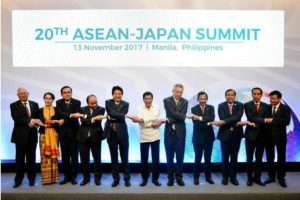Analysis – The Rohingya crisis
 Sometimes an omission can say much more than an action.
Sometimes an omission can say much more than an action.
So it was at this week’s summit of Southeast Asian leaders, attended by Australia’s PM Malcolm Turnbull, held in the Philippines.
Several worthy communiques and declarations were issued about anti-corruption moves, tourism plans, environmental pacts and international cooperation to combat extremism in the region.
And there was even a brief reference about the importance of providing humanitarian relief for “affected communities” in Rakhine State.
But the elephant in the room and the word no one was mentioning was ‘Rohingya’.
And certainly no one made mention of the Burmese military’s campaign of ethnic cleansing that caused the flight of more than 500,000 Rohingya refugees to Bangladesh.
Maybe this was because Burma’s Nobel Peace prize laureate and the nation’s current “State Counsellor’ Aung San Suu Kyi was present at the summit.
The summit’s closing statement made no specific reference to the Rohingya. Instead, there was – almost as an afterthought – a euphemistic mention of the importance of providing humanitarian relief for “affected communities” in Rakhine State.
Surely, the world and the Rohingya deserve more than the mealy-mouthed mutterings of diplomatic-speak jargoneers that seem to suggest that there is not a humanitarian crisis underway.
The Rohingya people are clearly fleeing persecution and are deserving of their rights as refugees.
The advocacy group Human Rights Watch (HRW) has issued ‘ten principles’ aimed at guiding governments and aid agencies in addressing the Rohingya crisis.
The first is that the Rohingya who have fled Burma should be presumed to be refugees.
HRW says there’s plenty of supporting evidence for this; the recent campaign of killing, rape, arson and other abuses for example.
Also, the Burmese Government’s persistent pattern of gross rights violations against the Rohingya.
Someone needs to do something because clearly ASEAN is not up to the task.
Laurie Nowell
AMES Australia Senior Journalist












